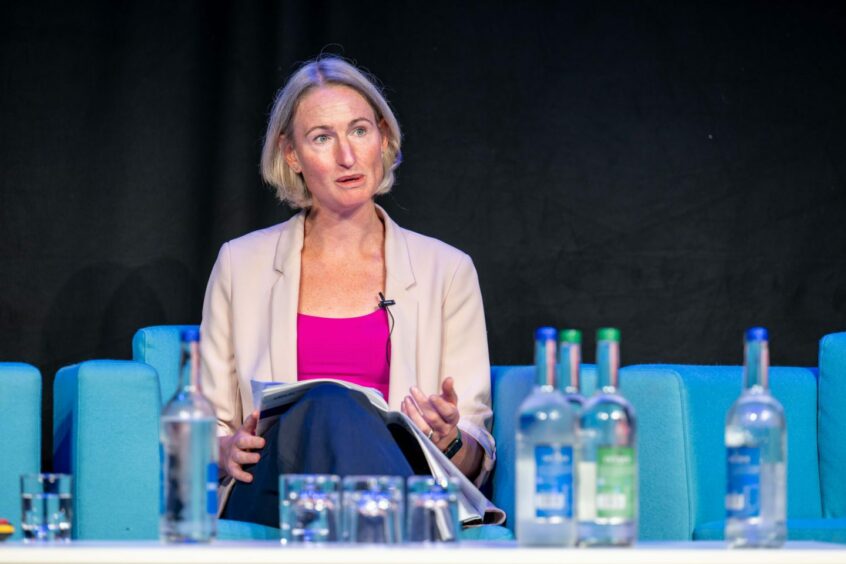
This year has seen the UK’s political parties go toe to toe in the debate surrounding energy transition, however, OEUK’s Jenny Stanning asks are party views “really that different?”.
The road to net zero has been something of a political hot potato this year as the oil and gas industry looks forward to hearing the winners of the 33rd North Sea licencing round.
Trade body Offshore Energies UK’s (OEUK) external relations director, Jenny Stanning set the scene for those attending the ‘Walking the line between energy security, resilience, affordability, and responsibility’ at Offshore Europe in Aberdeen.
Ms Stanning said: “In the last couple of weeks the conservative party has committed to ‘max out’ the North Sea and they’re really supportive of granting new licences.
“The Labour Party have come out and said they are not that keen, but the Lib Dems and SNP still aren’t convinced.”
With the backdrop of politicians offering up seemingly polar opposite outlooks, the external relations director told attendees: “You’d be forgiven for thinking that these parties are hopelessly divided on energy policy but when you look a bit closer, are they really that different?”
She said that “all of our political parties” have demonstrated a commitment to energy security.
Ms Stanning added: “They don’t want to turn the taps off on the North Sea straight away, they don’t want to threaten jobs or the communities that depend on this industry throughout the country, albeit the short-term policies they’re perusing threaten to do just that.
“That’s not all that unites them, they all love our supply chain, they want our people and their expertise, they enjoy our export success and even on fiscal policy, there’s something that unites everybody.”
Labour and Tories united on windfall tax as industry calls for investor security
After outlining that both sides of the political fence looking to secure jobs and support the supply chain, Ms Stanning turned her attention to what is arguably the most contentious topic at the intersection between energy and politics, the energy profits levy.
The EPL, also known as windfall tax, has been widely criticised by the energy sector with many firms lowering investment in UK projects as a result.
Earlier this year, the UK government announced that a price floor would be implemented for the controversial taxation scheme, however, the update still did not inspire confidence in the sector.
For the tax rate to drop, both average oil and gas prices need to fall to, or below, $71.40 per barrel for oil and £0.54 per therm for gas, for two consecutive quarters.
At the time of the announcement Claire Angell, partner and head of energy tax at KPMG in the UK said that the “forward price curves currently indicate that this relief will never kick in.”
Despite the controversy surrounding the legislation, OEUK’s external relations director said that the government and the opposition “agree that windfall taxes should be temporary and targeted.”
Ms Stanning added: “Both are looking at longer-term options for fiscal stability for the offshore energy industry. No party wants the consumer to pay directly for the cost of meeting that statutory obligation we have here in the UK for meeting net zero by 2050.
“So they need industry investment, and they need our jobs, either directly investing into the energy transition or indirectly into the economy to support the longer-term mass borrowing programme.”
Windfall tax criticisms
The energy sector has argued that the EPL has been deterring investment in the UK and driving capital overseas.
Simon Roddy, senior vice president of upstream for Shell UK, followed Ms Stanning to tell attendees about the “importance of stability” for investment.
Mr Roddy explained: “From an operator perspective, it really comes down to that confidence to be able to invest.”
The supermajor boss said that the Climate Change Committee’s balanced net zero pathway accounts for more oil and gas production that the North Sea Transition Authority predicts will be produced between now and 2050.
“That shows a very significant gap,” Mr Roddy said, this data served to illustrate that UK will rely on hydrocarbon imports as it progresses to net zero.
It is also worth noting that the Climate Change Committee has also recommended a presumption against new oil and gas in the North Sea.
The Shell boss argued that continued oil and gas production is “better for emissions, it’s better for jobs, the 200,000 or more that are supported in the UK far more and it’s clearly better for energy security.”
Unlocking the remaining oil and gas opportunities in the North Sea is set to regain the investor confidence that has been lost as a result of the windfall tax, the conference heard.
Mr Roddy warned: “We cannot, for one second, be complacent. Capital will inevitably flow to where it’s most stable.”
It’s ‘fashionable to beat up on the oil and gas industry’
Steve Nicol, executive president of operations at Wood, also supported investment in the UK sector as the firms within oil and gas are those bankrolling the energy transition.
Mr Nicol had attended the OEUK business breakfast and quoted the figures presented.
The Wood boss said: “To get to net zero, there needs to be £1.4 trillion worth of investment, a huge number.
“Probably the bigger stat for me, however, was that of that £1.4 trillion worth of investment, £1 trillion of that is going to come from private investment.”
Mr Nicol highlighted the importance of keeping oil and gas firms within the UK.
Finally, Alan Murray, chief operating officer of Kellas, supported Mr Roddy’s point that cash can go overseas if firms do not see the right investment environment.
Mr Murray said that “fashionable to beat up on the oil and gas industry” and that this hostility firms see in the UK harms investment.
He explained: “That happens a lot in the press, we see lots of vocal opposition to what we’re doing”
Mr Murray added: “We have to tell our story. We’re a necessary part of the energy mix and will be for a long time coming. But to attract that investment is you, we can’t keep demonising it, it will go elsewhere. Investment always has a choice.
“We are owned by large private equity firms, and they have a choice. So, one of the things we’re looking for is stability that will confer certainty over investment, if you put your money down and invest it in the UK are you going to get a return?”

 © Supplied by Michal Wachucik
© Supplied by Michal Wachucik © Supplied by OGUK
© Supplied by OGUK © Supplied by Michal Wachucik
© Supplied by Michal Wachucik